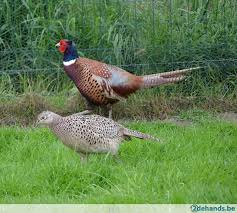Pheasant (Phasianus colchicus) is popular small game that was introduced by the Romans. In Greek it means " bird of Phasis”, a river east of the Black Sea.
 The cock has a strikingly beautiful plumage with metallic luster and a long bushy tail consisting of eighteen pens, measuring about 83 cm and its weight is about 1250 grams.
The cock has a strikingly beautiful plumage with metallic luster and a long bushy tail consisting of eighteen pens, measuring about 83 cm and its weight is about 1250 grams.
The hen has a practical light brown mottled brood camouflage, she is about 58 cm tall and weighs about 900 grams.
Pheasants are only active during the day. They live in groups. In winter, that are groups of three or four males with a few hens, but sometimes only cocks. Roosting (rest in a lodging place or on a branch, vigilant sleep), the group does in trees or shrubs, or failing that in a sheltered spot on the ground. The pheasant is primarily a flightless bird, walking and looking for food.
When in danger, they run away fast or rise labored almost straight up. However, they fly surprisingly fast, over 60 miles per hour. He will come down again after a few hundred meters in a glide.
They prefer a moist environment with the necessary coverage, grassland with low crops.
They forage in the early morning and a few hours before sunset. They eat seeds, acorns, tubers, berries, roots, snails, aphids, beetles, amphibians...
The courtship (wooing, dancing) is in February or March. Brooding lasts an average of 24 days.
In a simple nest in tall grass or rough growth the hen puts the eight to twelve olive- brown to bluish green, not spotted eggs.
A pheasant always flies to her nest, because walking leaves a scent trail that can be followed by robbers (weasel, ermine). As a pheasants nest is in danger the hen feigns an injury to lead off the enemy. She does this even if the eggs have not yet hatched. She runs with a trailing wing like if she is injured, away from the nest. The chickens then quietly sneak out of the nest and hide dead quiet in the surrounding vegetation.
Previously pheasants were hung for several days to wither, their flesh began to dissolve, resulting in a particularly strong taste. They were ‘faisanded ‘until the meat was noble. Today, that no longer happens.
(Communal) roosting is sleeping in a colony by bats or birds (swallow, sparrow, starling). Huge troops often use the same (somewhat sheltered) place for years on end. Potential attackers are quickly noticed by half-watching group members. Just as with fishing schools, it is more difficult for robbers to concentrate on one prey. By sitting close together they keep each other warm at night.
‘Nice weather huh?’ To which the other snipe replied:
"Shut up, snipes cannot talk."
